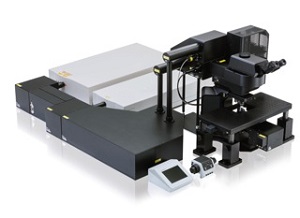Demonstrating the company’s commitment to advancing microscopy, Olympus will display its latest light microscopy systems and accessories at Analytica, hall A2, booth 309, April 1-4 Munich, Germany. The range of cutting-edge systems on show enables a myriad of new, and even unusual, life and materials science applications.

Multiphoton microscopy presents a powerful tool within life science research achieving fundamental insights into the intricate and complex workings of biological systems. Pushing technology boundaries, Olympus has developed a new multiphoton excitation system, the FluoView FVMPE-RS. The system enables high-precision, ultra-fast scanning and stimulation, allowing researchers to see deep within specimens, take measurements at the highest speeds, and capture images, even when working under the most demanding conditions. In his presentation at the BIOTECH Forum (2nd April, 2pm) entitled “The new FluoView FVMPE-RS: an advanced multiphoton microscope for imaging with high speed and extended IR range” Olympus application specialist Dr Bjoern Sieberer will explain the capabilities of the new system in detail.
At booth 309, visitors can experience the unprecedented flexibility of the customisable IX3 ‘open source’ frames, where bespoke systems are effortlessly created by exchanging optical modules into an accessible infinite light path. Expanding the capabilities of the IX3, a range of accessories are available, and the high-end IX83 frame will be optimised for advanced live cell imaging with the cellVivo incubation system and cell^tirf laser module. Centred on workflow ergonomics, the modular and flexible cellVivo incubator is based on a “one size fits all” concept, with adaptors for various frame types. As well as precise control of environmental conditions and user-friendly remote monitoring, cellVivo is uniquely accessible with just one hand, enabling simultaneous handling of the incubator and specimens for swift usage, protecting samples from prolonged exposure to the external environment.
With optics and DIC capability enabling resolving power beyond that of a typical light microscope, a materials science system has found an unusual application within the area of reproductive toxicology. Visitors to the booth will have the chance to speak with researchers about their use of the LEXT for the morphological analysis of sperm and other pathological specimens, as a potential alternative to scanning electron microscopy. The LEXT OLS4100 will be on show alongside the award-winning DSX, for enhanced non-destructive inspection and metrology.
To find out more about Olympus microscope systems and their uses, visit us at hall A2, booth 309, or go to www.olympus-europa.com/microscopy and www.olympus-ims.com/en/microscope